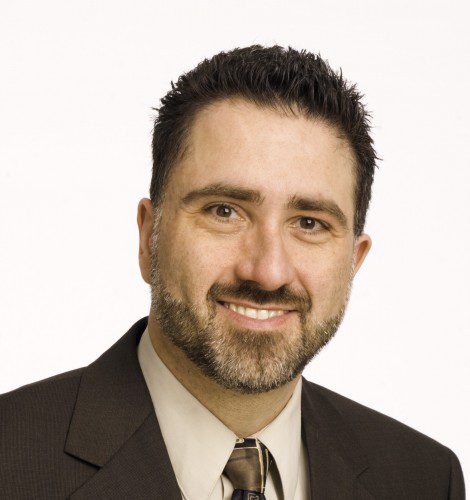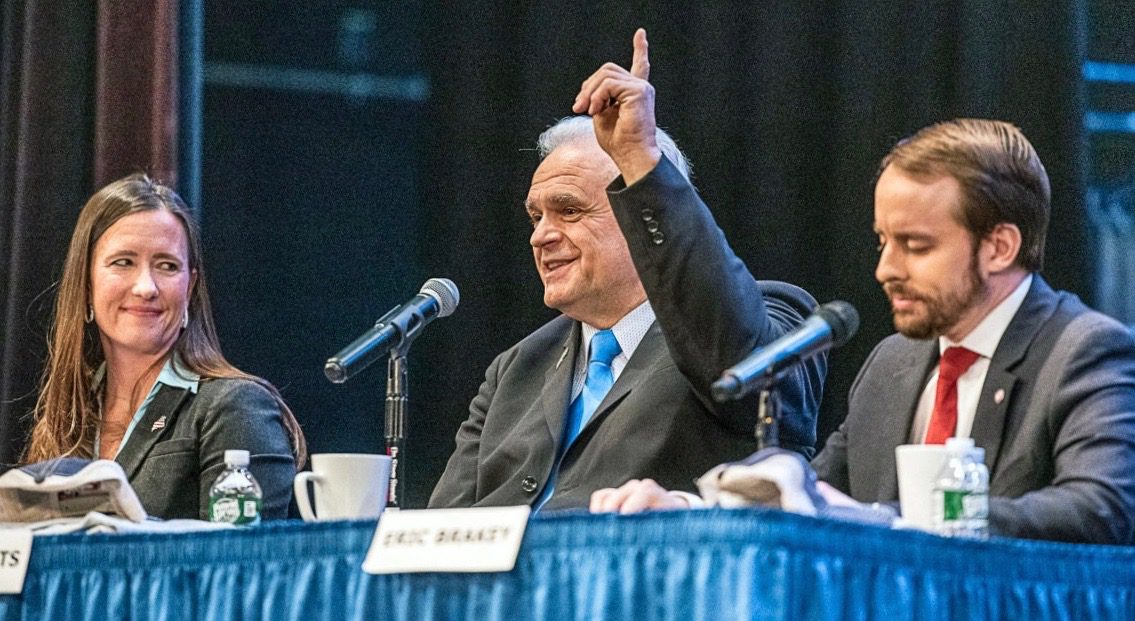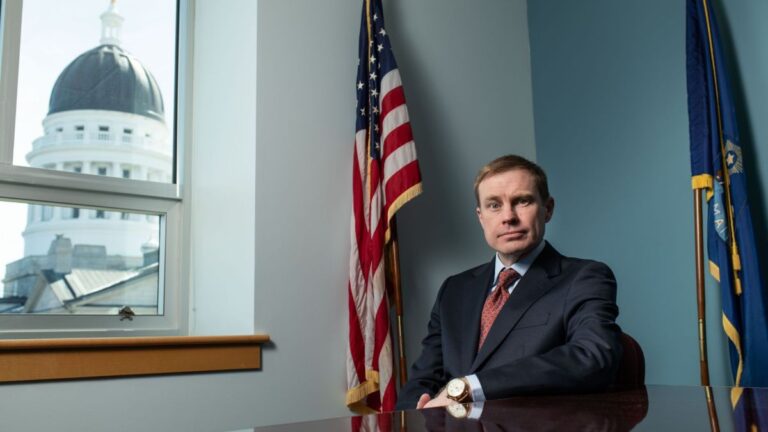Dale Crafts was 39 years old and selling cars with his brother in the late 1990s when he decided to volunteer for a campaign to overturn a gay-rights law that would have prohibited discrimination based on a person’s sexual orientation.
He made phone calls to voters and recruited 13 others from the Open Doors Baptist Church in Lisbon to help, according to a 1998 story in the Portland Press Herald.
“This has motivated me,” he told the newspaper. “This has motivated a lot of people.”
Ultimately a majority of voters agreed with those who opposed the legislation, overturning the non-discrimination law that had been signed by Gov. Angus King by 7,317 votes. It took another seven years — and the rejection of another people’s veto effort — for the non-discrimination act to become law again.
Crafts, now the Republican running for the 2nd Congressional District seat against incumbent Democrat Jared Golden, is expected to be asked to vote on a similar federal bill should he defeat Golden on Nov. 3. Golden and Rep. Chellie Pingree (D-1st District) voted in support of the Equality Act in 2019 when it passed the House by a wide margin, with all Democrats plus eight Republicans voting yes.
Maine Republican Susan Collins co-sponsored the Senate bill.
But Majority Leader Mitch McConnell is not likely to bring it to a vote in the Senate before the end of the term, said David Stacy, government affairs director for the Human Rights Campaign in Washington. That means a new version will need to be re-introduced to the new Congress after it is seated in early January.
The act would provide protections for LGBTQ people in employment, housing, credit, public spaces and federally funded programs, Stacy said. While 22 states, including Maine in 2005, have passed laws to prohibit discrimination based on sexual orientation or gender identity, there’s no federal law offering such protections.

In states without a nondiscrimination law, it’s legal for a bakery to refuse to make a wedding cake for a same-sex couple or for a clothing shop to refuse service to a transgender person looking at dresses, Stacy said.
“We still very much need the Equality Act,” he said.
But Crafts, based on comments he made to the Christian Civic League of Maine in June, is unlikely to support the legislation if elected. Crafts and his campaign did not respond to repeated phone calls and emails from The Maine Monitor requesting an interview.
During the Republican primary, the Civic League executive director, Carroll Conley, and its policy director, Michael McClellan, interviewed Crafts for about 12 minutes, giving him a chance to talk about his background and answer questions. In a video posted on YouTube, Crafts described himself as “100 percent pro-life” and said if elected, he would “always vote against any public financing of Planned Parenthood.”
McClellan asked him to talk about businesses and “individuals of faith being accused of discrimination for refusing to participate in the redefinition of marriage and gender.”
Crafts said he thinks the Constitution and the Civil Rights Act of 1964 already protect gay and lesbian people from discrimination.
“Well, you know, gender identity should never be a special protected category under the law,” Crafts said. “And I always have to wonder, I mean how many categories of special rights are we going to have? I mean, what’s the next one? You know, if we’re all covered under the Constitution, I don’t think we should be passing special rights legislation.”
Crafts appeared to be referring to a Supreme Court decision from June, when the court ruled 6-3 that people cannot be fired from jobs because of their sexual orientation or gender identity. The decision addressed three instances of people being fired because they were gay or transgender. In writing the majority opinion, Justice Neal Gorsuch referenced the Civil Rights Act of 1964, in which Congress “outlawed discrimination in the workplace on the basis of race, color, sex or national origin.”
“Today we must decide whether an employer can fire someone simply for being homosexual or transgender,” he wrote. “The answer is clear. An employer who fires an individual for being homosexual or transgender fires that person for traits or actions it would not have questioned in members of a different sex.”
LGBTQ rights advocates say the decision only covers employment and even so, it’s better to enshrine the decision in law by passing the Equality Act.
“It’s important because it is always helpful to have legal coverage spelled out in a statute,” said Jennifer Pizer, law policy director for Lambda Legal, the nation’s oldest and largest legal organization working for equality.
In addition to the Equality Act, Stacy said there are likely to be votes on bills to ban conversion therapy, an anti-bullying measure to help better protect gay or transgender children, and possibly votes related to President Donald Trump’s decision to ban transgender people from serving openly in the military.
How Crafts will vote on any of those measures is unclear. The Golden campaign did not respond to requests for comment, but the Human Rights Campaign spoke highly of his support for LGBTQ rights.
“Jared Golden has been a real champion for equality,” Stacy said. “He seems to understand every Mainer is a full citizen.”
‘Not the Bible Belt’
If polls are accurate, the Golden-Crafts race isn’t particularly close — at least at this point.
Golden led Crafts 52 percent to 34 percent in a Bangor Daily News-Digital Research poll released Oct. 6. The poll, which surveyed 234 likely 2nd District voters, found 11 percent of them undecided and has a margin of error of 6.2 percentage points.
Yet two years ago, Golden barely won election in the state’s first ranked-choice voting race, edging incumbent Republican Bruce Poliquin by less than a percentage point, 50.6 percent to 49.4 percent. Typically the district has shown support for Republicans; the Oct. 6 BDN poll showed Collins and Trump gaining ground. Also, in 2016 the 2nd District split with the rest of the state in awarding Trump one electoral vote.
Crafts has closely aligned himself with Trump, who endorsed him via Twitter, and his son, Donald Jr., stumped for Crafts in Bangor and Holden in September. Crafts, a former state representative and Lisbon town councilor, has said he decided to run for Congress because of a religious calling.

The day after winning the Republican primary in mid-July, Crafts was interviewed by Ray Richardson of WLOB News Talk Maine. Richardson congratulated him and later asked about the role prayer played in his decision to run.
“I wasn’t looking to do this,” Crafts answered. “Sometimes you just have that calling. And that’s exactly what took place. You know, I sit back and just marvel at — my whole team just marveled at — so many times through this campaign that we saw God’s hands in it. And (we would) just look at each other and go ‘wow.’ And so, you know, it’s just all coming together and glory be to God.”
Mark Brewer, political science professor at the University of Maine at Orono, said Crafts’ religion could both help and hurt him in the race.
“While Maine’s 2nd CD is more conservative than likely any other congressional district in the Northeast, it is also not the Bible Belt,” Brewer said in response to emailed questions. “Crafts’ high levels of religiosity and social conservatism will be appealing to some voters, but off-putting to others.”

Lisa Ward, a former Lisbon town council member and chairwoman of the Lisbon Democratic Committee, described Crafts as a nice person who is well-liked in his hometown. She said his positions on LGBTQ rights are a result of his evangelical beliefs.
“He’s not a mean person but he’s got very backward ideas,” said Ward, who married her wife Mel Cloutier soon after Maine legalized same-sex marriage in 2012.
And when she hears someone use the term “special rights?”
“They mean somebody is asking for more rights than them,” she said. “It’s always a sign they are not in favor of making sure everyone is equal in any way.”
‘Wooing evangelical votes’
Conley, of the Civic League, said he got to know Crafts in the fall of 2010.
“Dale got involved in the bipartisan prayer caucus where the staffers and senators and representatives gathered,” Conley said.
The civic league endorsed Crafts in September along with a slate of other candidates. Conley said he will speak at events in the 2nd District if asked, and the league will send out emails and use its social media platforms to encourage voters to support Crafts.
With limits on indoor gatherings because of the pandemic for much of the campaign, Conley said church attendance is down, making it more difficult for Crafts to directly appeal to potential supporters.
“That’s some efficiency that will be lost that Dale would be able to take advantage of,” Conley said. “Every candidate is challenged by that. In particular, the ability to meet where people already gather is going to be limited.”
Conley said Crafts’ strengths as a candidate – his personal story of overcoming the motorcycle accident that requires him to use a wheelchair, his years of business experience and his time spent in politics on the state and local level — will be a compelling message. For evangelicals, his strong pro-life stance and consistent conservatism will be appealing, Conley said.
“You cannot win by just wooing evangelical votes in the 2nd District but you can’t win without them,” he said. “He is a man that feels so blessed because of what he’s overcome. The 2nd District will embrace that.”







